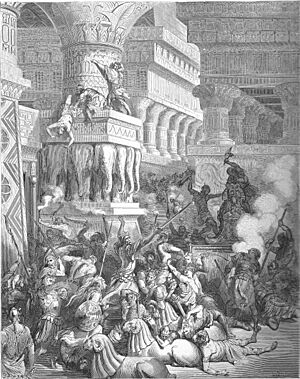Jonathan Apphus facts for kids
Quick facts for kids Jonathan Apphus |
|
|---|---|

A 16th-century drawing of Jonathan Apphus by a French artist.
|
|
| Leader of the Maccabees | |
| Reign | 161–143 BCE |
| Predecessor | Judah Maccabee |
| Successor | Simon Thassi |
| High Priest of Judaea | |
| Successor | Simon Thassi |
| Died | 143 BCE Baskama |
| Burial | Modi'in |
| Dynasty | Hasmonean |
| Father | Mattathias |
| Religion | Second Temple Judaism |
Jonathan Apphus was an important leader of the Hasmonean dynasty in Judea. He led his people from 161 to 143 BCE. He was one of the sons of Mattathias, who started a big rebellion. Jonathan played a key role in the fight for Jewish freedom.
Contents
What's in a Name?
Jonathan Apphus was one of five brothers. Each of Mattathias's sons had two names. For example, his brother John was also called Gaddis. Simon was called Thassi, and Judah was Maccabee. Jonathan's second name was Apphus. Historians are not sure why they had these nicknames. Some think "Apphus" might mean "the wary" or "the dissembler." But the exact meaning is still a mystery.
Leading the Jewish People
Jonathan Apphus was the youngest of Mattathias's five sons. His father, Mattathias, was a priest who began a rebellion. This rebellion was against Antiochus IV Epiphanes and the Seleucid Empire. Mattathias died in 167 BCE, just as the fight was starting.
Jonathan and his brothers promised to continue their father's rebellion. His brother, Judah Maccabee, became the first leader. Judah was a strong military chief. Jonathan fought alongside Judah in many battles.
Judah died in a battle in 161 BCE against a Seleucid general named Bacchides. After Judah's death, the Jewish rebels needed a new leader. Jonathan was chosen to take his brother's place.
Jonathan realized that Bacchides was trying to trap him. So, Jonathan, his brothers Simon and John, and their followers went to a desert area. This area was east of the Jordan River. They set up camp near a swamp. Bacchides followed them and attacked on the Shabbat.
Jonathan sent his brother John with their supplies to the friendly Nabataeans. But a hostile group called the "sons of Jambri" ambushed them. John and his friends were killed, and their supplies were stolen. Later, Jonathan and his brothers got revenge. They attacked a wedding party of the Jambri, killing many and taking their treasure.
Jonathan and his men then fought Bacchides near the Jordan River. Jonathan almost defeated Bacchides in person. The Jewish fighters were defeated and swam across the Jordan River to safety. Bacchides lost many men and did not try to cross the river again. He went back to Jerusalem. Jonathan and his forces stayed safe in the swampy area. Later, Bacchides left the country.
A Change in Fortune
Jonathan did not stay quiet. He continued to fight against Jews who had adopted Greek ways. Two years after Bacchides left, a fortress in Jerusalem called Acra felt threatened. They asked Demetrius, the Seleucid king, to send Bacchides back.
Jonathan was now very skilled in guerrilla warfare. This meant he used surprise attacks and avoided big battles. He was always careful to avoid direct fights with the enemy. Bacchides became frustrated and reportedly killed fifty of his own Hellenist leaders. Jonathan and his brother Simon decided to retreat further. They fortified a place in the desert called Beth-hogla. Bacchides then surrounded them there for several days.
Jonathan realized Bacchides wanted to end the fight. He offered a peace treaty and to exchange prisoners. Bacchides agreed quickly. He even promised never to fight Jonathan again. Bacchides and his forces then left Judea. Jonathan, now victorious, settled in the old city of Michmash. From there, he worked to remove those who had turned away from Jewish traditions.
Becoming High Priest
Jonathan used this peaceful time to gain more power. An important event outside Judea helped him. King Demetrius I Soter was having problems with other powerful rulers. These rulers supported a rival, Alexander Balas, who claimed to be the son of a former king.
Demetrius needed help, so he called back his soldiers from Judea. He left only small groups in Jerusalem and Beth-zur. He also tried to win Jonathan's loyalty. Demetrius allowed Jonathan to raise an army. He also let Jonathan take back hostages held in the Akra fortress. Jonathan happily accepted and moved to Jerusalem in 153 BCE. He began to make the city stronger.
Alexander Balas also contacted Jonathan with even better offers. He officially made Jonathan the High Priest in Jerusalem. Jonathan accepted Alexander's offer, not trusting Demetrius. This made Jonathan the first leader of his family to become High Priest. This title was very important. Jonathan became the official leader of his people. Those who favored Greek ways could no longer attack him easily. In 153 BCE, Jonathan wore the High Priest's special clothes for the first time.
Demetrius later lost his throne and his life in 150 BCE. Alexander Balas became the sole ruler of the Seleucid Empire. Alexander was also given the honor of marrying Cleopatra Thea, the daughter of the Egyptian king Ptolemy VI.
The wedding happened in Ptolemais. Jonathan was invited and arrived after the ceremony. He brought gifts for both kings. He was allowed to sit with them as an equal. Alexander Balas even gave Jonathan his own royal clothes and honored him greatly. Alexander did not listen to those who accused Jonathan. Instead, he made Jonathan a general and governor of a province. Jonathan returned to Jerusalem with great honor.
Victory Over Apollonius
Jonathan showed his loyalty. In 147 BCE, Demetrius II Nicator, son of the first Demetrius, tried to take the throne from Alexander Balas. Apollonius Taos, a governor, likely supported Demetrius II. Apollonius challenged Jonathan to a battle. He dared the Jews to leave their mountains and fight on the open plain.
Jonathan and Simon led 10,000 men against Jaffa, where Apollonius's forces were. Jaffa was not ready for an attack. Its gates were opened to the Jewish forces out of fear.
But the fight was not over. Apollonius received more soldiers and appeared on the plain with 3,000 men. Jonathan's forces were outnumbered. But Apollonius, trusting his strong cavalry, forced Jonathan into battle. Jonathan attacked, captured, and burned the city of Azotus. He also burned the temple of Dagon and nearby villages.
As a reward for his victory, Alexander Balas gave Jonathan the city of Ekron and its surrounding land. The people of Azotus complained to King Ptolemy VI, who had come to fight Alexander Balas. They said Jonathan had destroyed their city and temple. Jonathan met Ptolemy peacefully in Jaffa. He traveled with Ptolemy for a while. Then Jonathan returned to Jerusalem, keeping peace with the Egyptian King.
Under Demetrius II
In 145 BCE, Alexander Balas was defeated and killed in a battle. Ptolemy VI, his father-in-law, also died in the battle. Demetrius II Nicator became the sole ruler of the Seleucid Empire. He also married Cleopatra Thea.
Jonathan did not owe loyalty to this new king. He used this chance to surround the Seleucid fortress in Jerusalem. This fortress was a symbol of Seleucid control. It also gave shelter to Jews who favored Greek ways. Demetrius was very angry. He came with an army to Ptolemais. He ordered Jonathan to meet him. Jonathan went, bringing elders and priests. He calmed the king with gifts. The king not only confirmed Jonathan as High Priest but also gave him three Samaritan regions: Mount Ephraim, Lod, and Ramathaim-Zophim. In exchange for 300 talents of silver, the whole country was freed from taxes.
Soon, a new person claimed the Seleucid throne. This was young Antiochus VI Dionysus, son of Alexander Balas. He was very young, but a general named Diodotus Tryphon used him to gain power. Demetrius needed help against this new enemy. He promised to remove his soldiers from Jerusalem if Jonathan sent troops. Jonathan, now called an ally, sent 3,000 men to protect Demetrius in his capital, Antioch.
Supporting Tryphon
Demetrius II did not keep his promise to remove his soldiers. So, Jonathan decided to support the new king, Antiochus VI, when Tryphon took the capital. Antiochus VI confirmed all of Jonathan's rights. He also made Jonathan's brother Simon a general of the coast, from Tyre to Egypt. Jonathan and Simon traveled the region, removing Demetrius II's soldiers. Ashkelon surrendered willingly. Gaza was taken by force. Jonathan defeated Demetrius II's forces that attacked from the north. Meanwhile, Simon took the strong fortress of Beth Zur and put his own soldiers there.
Jonathan also sought alliances with other nations. He renewed a treaty with the Roman Republic. He also exchanged friendly messages with Sparta and other places.
Captured and Death
In 143 BCE, Diodotus Tryphon came to Judea with an army. He invited Jonathan to a friendly meeting in Scythopolis. Tryphon convinced Jonathan to send away his army of 40,000 men. He promised to give Jonathan Ptolemais and other fortresses. Jonathan fell into the trap. He took 1,000 men with him to Ptolemais. All of his men were killed, and Jonathan himself was captured.
When Tryphon was about to enter Judea, Simon met him with an army ready for battle. Tryphon avoided a fight. He demanded 100 talents of silver and Jonathan's two sons as hostages. In return, he promised to free Jonathan. Simon did not trust Tryphon, but he paid the ransom. He did not want to be blamed for his brother's death. But Tryphon did not free Jonathan. Angry that Simon blocked his way, Tryphon executed Jonathan in Baskama, east of the Jordan River. Simon buried Jonathan in Modi'in. We do not know what happened to Jonathan's two captive sons.
See also
- Jewish leadership
- List of Hasmonean and Herodian rulers
 | DeHart Hubbard |
 | Wilma Rudolph |
 | Jesse Owens |
 | Jackie Joyner-Kersee |
 | Major Taylor |



